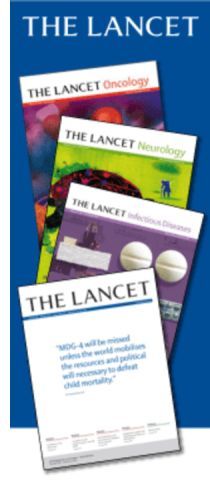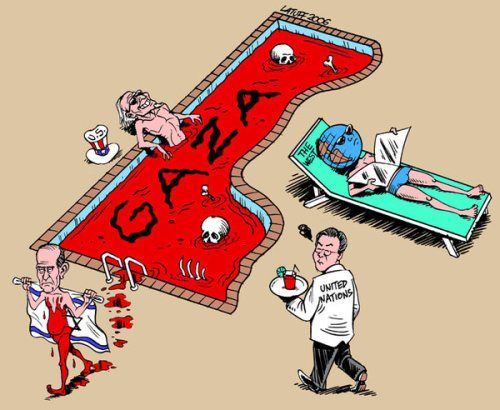Each year, UK medical journal, The Lancet, publishes a series of special reports exploring health conditions in the Palestinian territories. The journal is regarded as a prestigious publication and submitted articles are peer reviewed.
The Lancet’s 2013 report contains some 35 contributions, most of which, at first glance, appear to deal with quantifying genuine medical issues without unwelcome politicization. A closer look, however, reveals that the journal is still tainted with anti-Israel bias.
In 2010, the journal employed active supporters of the boycott, divestment and sanctions (BDS) campaign against Israel as supposedly expert commentators on the situation, which earned it a 2010 Dishonest Reporter Award. Lancet editor Richard Horton even posted a snide response aimed at HonestReporting.
Has The Lancet continued to politicize medicine? HonestReporting CEO Joe Hyams comments:
This latest series of reports contains some blatantly politicized language written by individuals who do not hide their anti-Israel affiliations. There should be no room for this in a credible medical publication.
Here, we take a look at some of the studies involved:
 Despite Israel’s disengagement in Summer 2005, this piece refers to Gaza as “occupied Palestinian territory” which “has been subjected to repeated Israeli assaults.”
Despite Israel’s disengagement in Summer 2005, this piece refers to Gaza as “occupied Palestinian territory” which “has been subjected to repeated Israeli assaults.”
The report concludes: “The best form of preparedness for an avoidable emergency is to stop the Israeli violence and end the isolation of the Gaza Strip through international efforts.”
The authors hold Israel entirely responsible. They fail to consider the role of terror groups firing rockets and mortars at Israeli civilians, forcing Israel to respond.
The politicized conclusion comes as no surprise when we consider the authors:
- Majdi Ashour: During his time as a student in the US, was a supporter of the Third Annual Palestine Solidarity and Divestment Conference at Rutgers, and a signatory to a petition that spoke of the Palestinian fight “against apartheid all over historic Palestine occupied in 1948? and “ethnic supremacy and pursuit of purity” being carried out by Israel.
- Aed Yaghi: The Director of the Palestinian Medical Relief Society (PMRS) in Gaza oversees an organization that NGO Monitor addresses its political advocacy: “Repeatedly claims that Israel violates “human rights,” employs methods of “collective punishment,” “deploys non-conventional weapons against civilians” and seeks to “oust the Palestinians… into densely populated enclaves fully controlled by Israel and geographically separate.”
This report claims to research “the long-term effects of political violence.” According to the abstract: “For every year from 1987 to 2011, participants indicated the degree from 0 (never) to 3 (frequently) to which they had been shot at, hit or kicked, verbally abused, saw other individuals humiliated, and had their homes raided.”
The term “political violence” is pejorative and indicative of bias. The only political violence in the area is carried out by terrorists. Israel carries out necessary security measures to protect its citizens. One thing we do not know is how many of these “humiliated” individuals subjected to alleged “political violence” were involved in terror activities that may have influenced their interactions with Israeli authorities and security forces.
One of the study’s findings is:
Post-hoc analyses showed that most of the chronically humiliated participants (85 [83%] of 103 men and 93 [66%] of 141 women) were living in distinct neighbourhoods in East Jerusalem and Hebron—two oPt cities that have a particularly strong presence of Israeli forces, and have frequent and several constraints (including checkpoints and barriers) on the Palestinian population’s mobility.
We would take issue with the assertion that any part of Jerusalem is a city in “occupied Palestinian territory.” And why exactly are there constraints on Palestinian mobility? Like the involvement of Palestinians in terror, the necessity of Israeli security measures are not mentioned.
To get a feel for the politics of the author, Brian K Barber, a look at his Twitter feed reveals retweets of material from vociferous anti-Israel sites such as Mondoweiss and Electronic Intifada.

This report’s abstract begins:
The Israeli military attack Pillar of Defence on the Gaza Strip, occupied Palestinian territory (also referred to as State of Palestine), from Nov 14—21, 2012, killed more than 190 and injured more than 1490 Palestinians.
Hardly a surprise considering the study’s author is one Mads Gilbert who made his name during Operation Cast Lead in 2009. The Norwegian doctor appeared on television screens around the world and in the pages of many newspapers slandering and accusing Israel of testing new and deadly weapons on Palestinian civilians.
At the time, Melanie Phillips wrote:
Gilbert was presented as just an ordinary doctor. But Gilbert appears not to be just an ordinary doctor. He is a political activist and member of the Norwegian Maoist ‘Red’ party. Not only is he viscerally hostile to Israel and a long-standing activist in the Palestinian ‘solidarity’ movement, but he even supported the 9/11 attacks.
Gilbert’s co-author Sobhi Skaik, consultant surgeon general at al-Shifa Hospital in Gaza also accused Israel of using experimental and unconventional weapons during Operation Cast Lead:
We are not sure exactly what type of weapon can manage to do that immediately and so cleanly… What is happening is frightening. It’s possible the Israeli army was using Gaza to experiment militarily.
[For more on Mads Gilbert and the role of medical NGOs in the Israeli-Palestinian conflict, see NGO Monitor’s NGO Malpractice: The Political Abuse of Medicine, Morality, and Science (PDF).]
This study concludes with the interpretation:
In the Gaza Strip, the trend in the increase in prevalence of birth defects began in 2005. The first documented use of air-delivered weaponry on the Gaza Strip started in 2001, and since then use of this weaponry has been a major environmental stress. Our data, in agreement with results obtained with other methods, reinforce our concern that toxic remnants of war could be a source of long-term effects on reproductive health. Further studies are warranted to ascertain the association between the accumulation of the toxic remnants and the prevalence of birth defects.
In other words – we can’t prove it but we think that Israeli weaponry is responsible for birth defects in Gaza.
What is not considered is this explanation that appeared in a CNN article examining a particular birth defect in Gaza:
There are an unusually high number of male pseudohermaphrodite births in the Gaza neighborhood of Jabalya, where Nadir and Ahmed live.
Dr. Jehad Abudaia, a Canadian-Palestinian pediatrician and urologist practicing in Gaza, says he has diagnosed nearly 80 cases like Nadir’s and Ahmed’s in the last seven years.
“It is astonishing that we have [so] many cases with this defect, which is very rare all over the world,” Abudaia says. He attributes the high frequency of this birth defect to “consanguinity,” or in-breeding.
“If you want to go to the root of the problem, this problem runs in families in the genes.” Abudaia says. “They want to get married to cousins… they don’t go to another family. This is a problem.”
Launch of Lancet Report Reveals the Bias Within
The Lancet’s report received an official launch in London last week. Blogger Richard Millett attended. According to him, Lancet editor Richard Horton said:
“By linking this kind of health research with human rights one can identify important and fresh perspectives. One example is the report about the denial of passage to Palestinian women during labour across the territory which fully fulfills the criteria of a crime against humanity.”
. . .
Then to the lectern came the main instigator of LPHA, Sir Iain Chalmers. Chalmers has been an almost permanent fixture in Gaza since 1970. He met his wife there and they even went to Gaza to celebrate their recent 70th birthdays.
Chalmers started by reading out a statement on the front cover of a 2009 edition of The Lancet. It mentioned “Palestinian”. He said:
“What really pleases me is that the word ‘Palestinian’ is in there. And it’s one way in which the Zionists have failed. They have not stopped the use of the word ‘Palestine’ or ‘Palestinian’. They have control in so many different domains. This is one that they cannot suppress.”
One of Chalmers’ slides then showed this cartoon by Carlos Latuff, who has drawn many cartoons with anti-Semitic themes which include comparing Israel’s treatment of the Palestinians to The Holocaust:
You can read Richard Millett’s full report here.
Clearly, The Lancet is continuing its anti-Israel bias and politicization of medicine.
If you are a certified medical professional, please administer a dose of medicine by sending your considered comments to The Lancet’s Ombudsman, Charles Warlow –[email protected]



